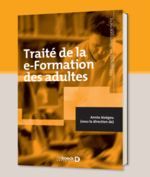This treatise offers a synthesis of the reference knowledge produced in adult e-learning. It brings together in a single volume 14 chapters or fundamental scientific texts by recognised French-speaking researchers in this field. The chapters together mark out a circumscribed field of knowledge linked to two levels of empirical observation and theoretical formalisation.
The first level concerns e-learning environments (instrumental, technical-pedagogical or socio-pedagogical dimensions) while the second level concerns the dynamics of adult learners in e-learning. These individual and/or collective dynamics are approached from the motivational (project, choice, commitment, persistence, etc.), metacognitive (memory, emotions, self-regulation of learning, etc.) or relational (collaboration/cooperation, mutual aid, etc.) angle. The two levels are both complementary and iterative. They refer respectively to the two parts of the treatise within which the reader can navigate from one chapter to another, according to his or her needs and current interests.
This treatise is a useful reference source for students, researchers and practitioners in the field. It allows them to access a common fund of knowledge produced by research and carrying praxeological implications in engineering. It is from this perspective, shared by all the contributors, that the present treatise, which is unique in the field of e-learning, was conceived.
To quote this book:
Jézégou, A. (2019). Traité de la e-formation des adultes. De Boeck supérieur.
Must-see
Designing and developing a constructive interaction between the learner and the digital learning environment - whether in a work, training or personal context - opens up many challenges for e-learning engineering.
During this conference, after having specified these challenges, Bernadette Charlier underlines the potential tensions induced by an interaction qualified as "destructive", as opposed to a so-called "constructive" interaction; that is to say, balanced, aligned and congruent between the learner and the digital learning environment.




